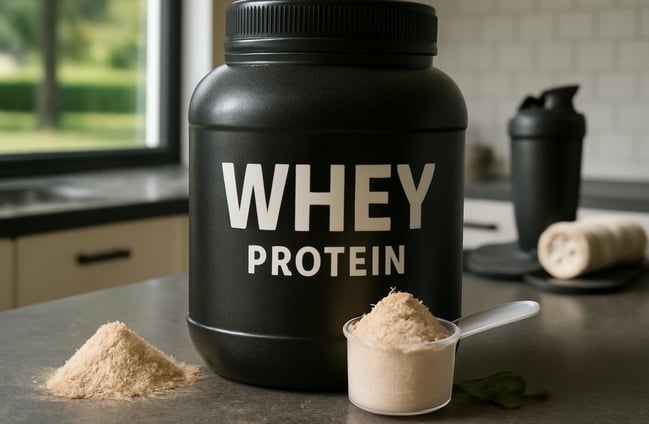Protein Made Simple: The Ultimate Guide for Beginners
Protein powders have taken the fitness world by storm, becoming a convenient and popular way to enhance dietary protein intake, especially for busy lifestyles. If you're new to protein powders, navigating the endless varieties can seem daunting. This guide is designed to simplify protein powder, helping beginners understand the basics and choose what's best for their fitness journey.
PROTEIN
4/21/20252 min read
What is Protein Powder?
Protein powder is a dietary supplement made by extracting protein from plant or animal sources. Common types include whey, casein, soy, pea, and rice protein, each offering unique benefits, absorption rates, and suitable applications based on dietary needs and fitness goals.
Protein powder provides several benefits, including convenience, muscle growth, and weight management. Its ease of preparation makes it an excellent nutritional option for busy individuals. Additionally, protein powder supports muscle recovery and growth, particularly when consumed post-exercise. It also aids in weight management by helping control hunger and reduce cravings, making dietary goals more attainable.
Types of Protein Powder
There are several common types of protein powder, each with distinct characteristics:
Whey Protein: Whey protein is a complete protein extracted from the liquid portion of milk that separates during the cheese-making process. This byproduct, known as whey, is then filtered, dried, and processed into powder form.
Casein Protein: Also milk-derived but absorbed more slowly, casein protein is ideal for consumption before bedtime to support muscle recovery and growth overnight.
Plant-Based Proteins (Pea, Soy, Rice): These are excellent alternatives for vegans, vegetarians, or individuals with lactose intolerance or other dietary sensitivities. They provide a high-quality protein source suitable for diverse dietary restrictions.
How to Choose the Right Protein Powder
Selecting the appropriate protein powder involves considering several key factors:
First, evaluate your dietary needs and restrictions. If you're vegan or lactose intolerant, plant-based options like pea, soy, or rice protein are ideal. If you're okay with dairy, whey and casein offer excellent muscle-building benefits.
Next, think about your fitness goals. For muscle gain and post-workout recovery, fast-digesting whey protein is effective. For sustained protein release, such as overnight muscle repair, slower-digesting casein is recommended. If your aim is weight management, choose a protein with low calories, low sugar, and high satiety value.
Pay close attention to nutritional labels. A quality protein powder should provide around 20–30 grams of protein per scoop, with minimal added sugars and artificial ingredients. Some powders also include added vitamins, minerals, or digestive enzymes, which can support overall wellness.
Finally, consider flavor, texture, and mixability. Some brands are known for great taste, while others may clump or have an aftertaste. Testing sample sizes or reading customer reviews can help you find a product you'll enjoy consistently.
Common Protein Powder Myths
There are several misconceptions surrounding protein powders:
Myth: Protein powders cause unwanted bulking.
Fact: Protein powders alone do not cause significant muscle bulk unless accompanied by intensive strength training and a caloric surplus.
Myth: Protein powders are unhealthy or unnatural.
Fact: High-quality protein powders consist of concentrated protein from natural sources, making them safe and healthy when used appropriately.
Recommended Usage
The recommended protein powder intake varies depending on your activity level, dietary habits, and fitness goals. Generally, 1–2 servings per day is sufficient for most individuals to meet their protein needs, especially when combined with a balanced diet.
Conclusion
Protein powders offer a convenient and efficient nutritional tool to enhance protein intake and support fitness objectives. Equipped with this foundational knowledge, you're prepared to select the ideal protein powder and seamlessly integrate it into your daily routine.




© 2025. All rights reserved.
